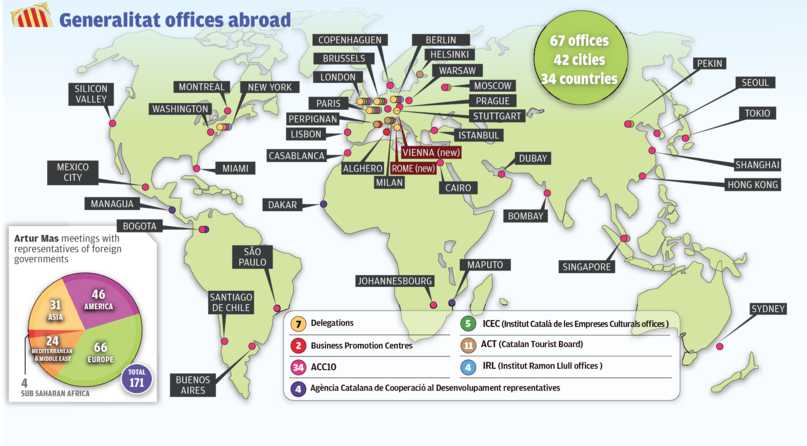Boost for foreign relations
Catalan government announces plans to open two new international delegations in 2015 with more to follow as the sovereignty process nears D-Day
The moment of truth for the sovereignty process is coming, and international recognition will be essential for the creation of a new Catalan state. The government is aware of this and is working on a new, decisive phase of international relations. The presidency minister, Francesc Homs, recently announced the opening abroad of two new government delegations this year, in Rome and Vienna, to join those in Brussels – which will be expanded – Paris, Berlin, London and Washington, which has an office in New York.
The choice of delegation in Rome is no accident, as Italy is the last large EU state that has no office, and the Catalan government is keen to establish bilateral relations with the Italian government and, to an extent, with Vatican City. Meanwhile, Vienna, with Geneva, is the European city that hosts the most multilateral institutions, above all the Organization for Security and Co-operation in Europe. Vienna is also strategically placed to maintain relations with central European states, such as the Czech Republic, Slovakia, Hungary and Slovenia.
Nor will these be the last delegations established, as the government plans to gradually open more in 2015, depending on the developing situation and the health of the Generalitat's finances. In its first term, the Mas government closed the Buenos Aires delegation with no plans to reopen it in favour of the EU.
The government's foreign policy, set out two years ago, was designed to go into effect in three phases. The first was the calling of a referendum – or now plebiscite elections – the second was the holding of the vote, and the third was to culminate in a proclamation of new state. In the first phase, a series of contacts was established with consuls, ambassadors and foreign governments, to present the Catalan case and gain credibility. This phase is just about over with the elections due soon, something which has stimulated the government into moving to the second phase. This consists of reinforcing the foreign presence with more personnel and resources to prepare for the decisive third phase, coming in a matter of months. The recent passing of new legislation allowing more foreign involvement helps to give the process a legal basis.
The proposed budget for 2015 reserves 19.7 million euros for foreign activities, 3.2 more than last year. Funds for developing foreign relations increase from 10.3 to 11.1 million, which includes the new delegations and the process of strengthening relations with international bodies, especially in the EU. The final act will be the creation of a foreign ministry under a new unity government.
Expert advice
To expand its international project, which has a budget but limited resources to develop aspirations that go beyond what is normally expected of a region, last year the government sought the services of Independent Diplomat, international diplomacy consultants specialised in providing advice to governments, political parties and NGOs, and very active in the US. However, PP and C's complained in parliament about a lack of information concerning the arrangement as well as the 360,000-euro cost. They have now referred the case to the Ombudsman, but the government defends its actions of consulting the company as “very useful” for decision making.

